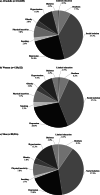Overall and sex-specific risk factors for subjective cognitive decline: findings from the 2015-2018 Behavioral Risk Factor Surveillance System Survey
- PMID: 35414037
- PMCID: PMC9004039
- DOI: 10.1186/s13293-022-00425-3
Overall and sex-specific risk factors for subjective cognitive decline: findings from the 2015-2018 Behavioral Risk Factor Surveillance System Survey
Abstract
Background: Prior research indicates that at least 35% of Alzheimer's disease and related dementia risk may be amenable to prevention. Subjective cognitive decline is often the first indication of preclinical dementia, with the risk of subsequent Alzheimer's disease in such individuals being greater in women than men. We wished to understand how modifiable factors are associated with subjective cognitive decline, and whether differences exist by sex.
Methods: Data were collected from men and women (45 years and older) who completed the U.S. Behavioral Risk Factor Surveillance System Cognitive Decline Module (2015-2018), n = 216,838. We calculated population-attributable fractions for subjective cognitive decline, stratified by sex, of the following factors: limited education, deafness, social isolation, depression, smoking, physical inactivity, obesity, hypertension, and diabetes. Our models were adjusted for age, race, income, employment, marital and Veteran status, and accounted for communality among risk factors.
Results: The final study sample included more women (53.7%) than men, but both had a similar prevalence of subjective cognitive decline (10.6% of women versus 11.2% of men). Women and men had nearly equivalent overall population-attributable fractions to explain subjective cognitive decline (39.7% for women versus 41.3% for men). The top three contributing risk factors were social isolation, depression, and hypertension, which explained three-quarters of the overall population-attributable fraction.
Conclusions: While we did not identify any differences in modifiable factors between men and women contributing to subjective cognitive decline, other factors including reproductive or endocrinological health history or biological factors that interact with sex to modify risk warrant further research.
Keywords: Behavioral Risk Factor Surveillance System; Cognitive dysfunction; Dementia; Risk factors; Sex factors; Subjective cognitive decline.
© 2022. The Author(s).
Conflict of interest statement
The authors have no conflicts of interest relevant to this study to disclose.
Figures
References
-
- World Health Organization. Dementia: a public health priority: World Health Organization; 2012. https://www.who.int/publications/i/item/dementia-a-public-health-priority. Accessed 20 Nov 2021.
-
- Donovan NJ, Amariglio RE, Zoller AS, Rudel RK, Gomez-Isla T, Blacker D, et al. Subjective cognitive concerns and neuropsychiatric predictors of progression to the early clinical stages of Alzheimer disease. Am J Geriatr Psychiatry. 2014;22(12):1642–1651. doi: 10.1016/j.jagp.2014.02.007. - DOI - PMC - PubMed
Publication types
MeSH terms
Grants and funding
LinkOut - more resources
Full Text Sources
Medical


